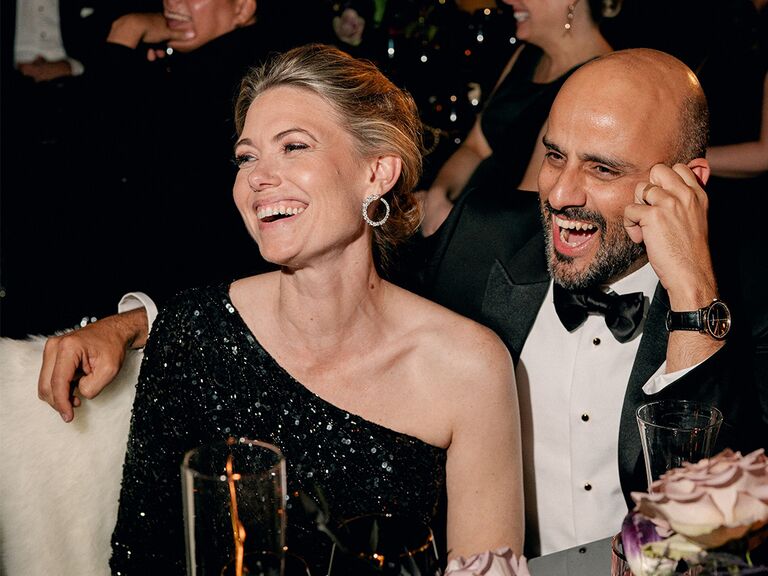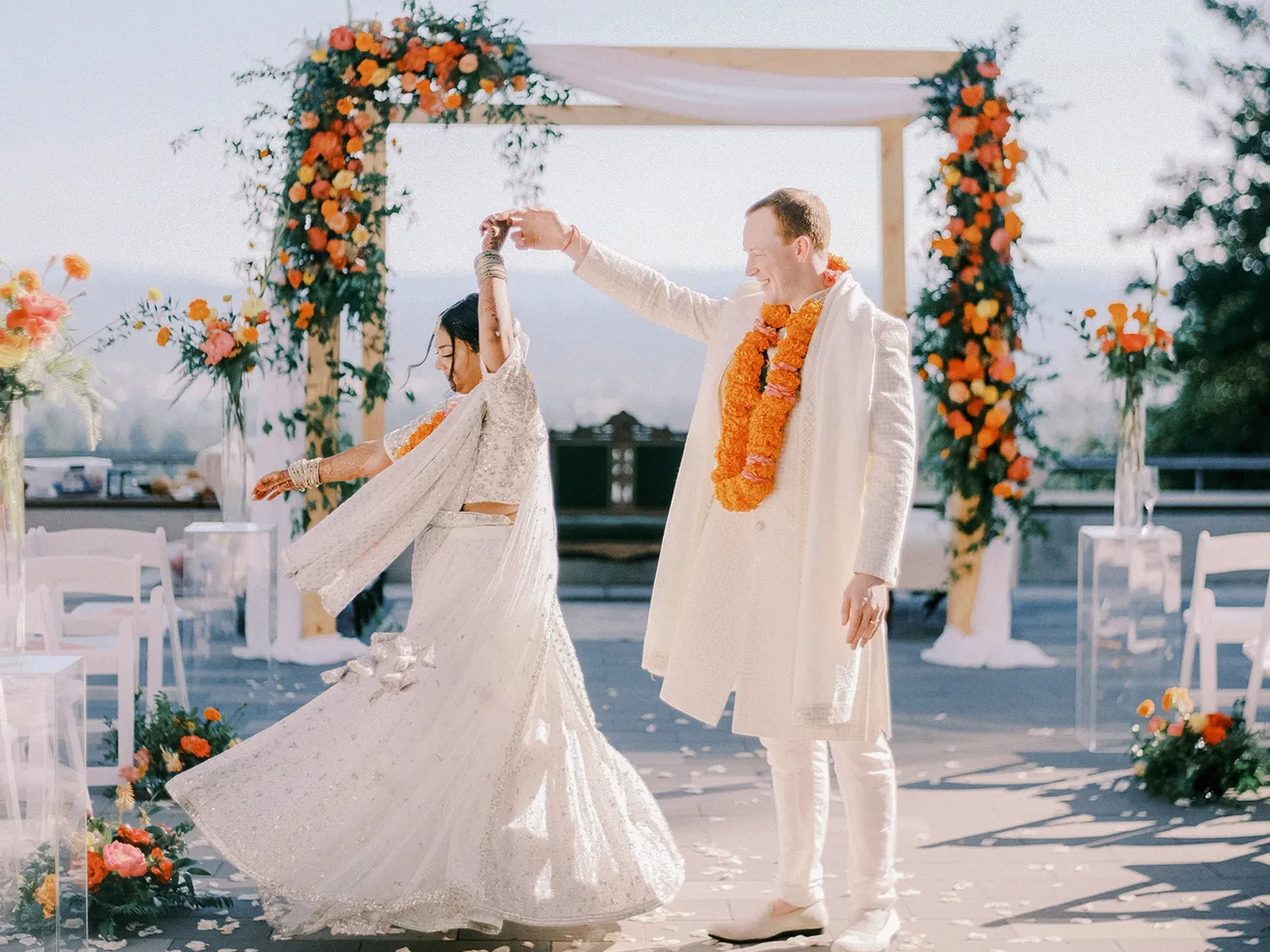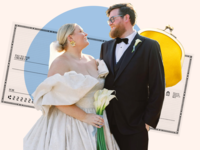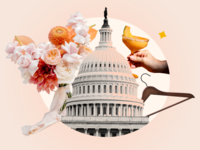Should You Pay for Your Plus-One at a Wedding?
The cost of each guest at a wedding always seems to be higher than you expect, which could have some budget-savvy couples wondering, should you pay for your plus-one at a wedding? The average catering dollar amount per wedding guest is $85, and that doesn't even begin to factor in the additional costs of adding to your guest count, like securing a larger venue or increasing your rental numbers.
While the traditional wedding plus-one etiquette might dictate that all guests should get a plus-one, that's no longer expected, especially given the steep rise in the average wedding guest cost. Giving married guests a plus-one is typically a standard rule, but, when it comes to those who are dating or single, you might decide to give your wedding party plus-ones, while letting your crew of college friends stick together without dates. Or you might decide that you're going to completely forgo plus-ones in lieu of inviting even more of your own friends.
As you're considering how to approach your plus-one strategy, The Knot Budget Advisor can help you estimate your budget based on your local wedding costs and determine how many plus-ones you can afford to hand out. And, from the wedding etiquette standpoint, we asked two wedding experts for their thoughts on how to balance making sure your guests feel like they have their person while also keeping your budget in check.
In this article:
- Do You Give All Wedding Party Members a Plus-One?
- Should You Pay for Your Plus-One at a Wedding?
- Who Pays for a Wedding Plus-One?
- How Much Additional Are Plus-Ones at a Wedding?
- Do You Pay More for Wedding Party Member Plus-Ones?
Do You Give All Wedding Party Members a Plus-One?
If you're having a 300-person wedding, you're probably looking at the numbers and wondering how you can skirt around handing out plus-ones like candy. It might occur to you that, perhaps, you can restrict your plus-ones to the wedding party and immediate family members. But, while that might seem like an easy workaround, it might actually cause more tension among the broader guest list.
"Rules and parameters that you and your partner set should apply to all guests. There are no hard and fast rules to plus-ones, so those restrictions are up to you," says AJ Williams, founder of AJ Events based in Boston. That means, if you decide that only married or live-in partners are getting plus-ones, you should extend that to all guests, including the wedding party. "Creating priority among friends could cause unnecessary issues and potentially hurt feelings that you want to avoid," Williams adds.
Applying an across-the-board plus-one rule gets stickier when you're considering immediate family, particularly parents who may be divorced and with new partners. "If your parent has remarried or entered into a long-term relationship, it's best to include their partner. If this guest would be a new date, then it depends on family, the size of the wedding, the type of event you want and the budget," Williams says.
Jilian Becker, owner and lead wedding planner at We Do Events based in Scranton, Pennsylvania, adds, "Chat with both parents early on to set expectations and see how everyone is feeling. Sometimes, it's as simple as checking in with each parent to make sure that no one is feeling left out and that their choices don't inadvertently cause tension."
Should You Pay for Your Plus-One at a Wedding?
The experts agree on this one—a guest should never, ever be expected to pay for their plus-one at a wedding, despite the temptation of some couples to assign a dollar-per-head cost for plus-ones they don't personally know. Williams says, "There's never a time when a guest pays to attend a wedding or bring a date. You are hosting your loved ones to celebrate with you and allowing a date doesn't change that."
Who Pays for a Wedding Plus-One?
"The couple should be accounting for plus-ones in their guest list and budget, and should be prepared to cover the associated costs," Becker says. There could be instances where a set of parents feels strongly about adding additional guests and plus-ones to a guest list, and they may decide to write a check for those extra seats, but that would be the only occasion where a plus-one could be paid for by someone beyond the couple or the person paying for the majority of the wedding.
How Much Additional Are Plus-Ones at a Wedding?
Becker reminds couples that the cost of a plus-one doesn't necessarily translate directly from the cost of a plate at a wedding. You have to consider their drinks, any tableware rentals, as well as budgeting for a venue that can accommodate an additional guest count.
She explains, "We recommend accounting for 10% more guests than you originally planned for. This gives you some wiggle room for unexpected plus-ones. Keep in mind that costs also go beyond just the guests' meals and drinks."
Do You Pay More for Wedding Party Member Plus-Ones?
If you're giving groomsmen or bridesmaid plus-ones to your wedding party, you're probably wondering if they're going to cost you more than the other plus-ones in attendance—and you wouldn't be wrong to assume they will. Williams says that, especially in the case of destination weddings, the plus-ones of wedding party members will also attend other events. "If it's a destination wedding, everyone should be invited to all events," Williams says. "That person traveled for the wedding and shouldn't be left behind in a hotel room for a pre-event or a post-wedding brunch."
However, even though it's expected that the plus-ones attend the rehearsal dinner, there are a few events where you can cut the guest list to only your nearest and dearest. Williams explains, "There are some exceptions, like a bridal or bridesmaid luncheon. Those are typically very small and only the wedding party is present, so it's not expected that a date would be included."




























